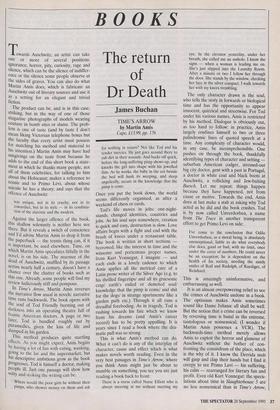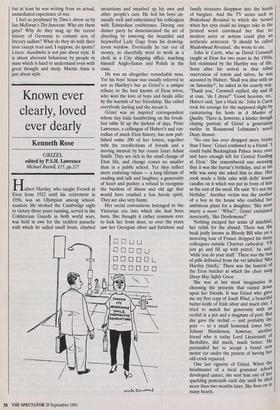BOOKS
The return of Dr Death
James Buchan
TIME'S ARROW by Martin Amis Cape, £1 3.99, pp. 176 Towards Auschwitz, an artist can take one or more of several positions: Ignorance, horror, pity, curiosity, rage and silence, which can be the silence of indiffer- ence or the silence some people observe at the sides of graves. You can also do what Martin Amis does, which is fabricate an Auschwitz out of literary sources and use it as a setting for an elegant and trivial fiction.
The product can be, and is in this case, striking, but in the way of one of those magazine photographs of models wearing couture in bomb sites or slums. The prob- lem is one of taste (and by taste I don't mean liking Victorian telephone boxes but the faculty that every artist must possess for matching his method and material to his intention.) Martin Amis may have had misgivings on the taste front because he adds to the end of this short book a state- ment in which he thanks many people, not all of them celebrities, for talking to him about the Holocaust; makes a reference to tennis and to Primo Levi, about whose suicide he has a theory; and says that the offence of Auschwitz was unique, not in its cruelty, nor in its cowardice, but in its style — in its combina- tion of the atavistic and the modern.
Against the larger offence of the book, this shallow solemnity is neither here nor there. But it reveals a twitch of conscience and I'd advise Martin Amis to drop it from the paperback — the tennis thing can, if it is important, be used elsewhere. Time, on which Martin Amis speculates fitfully in the novel, is on his side. The murmur of the dead of Auschwitz, muffled by its passage across nearly half a century, doesn't have a chance over the chatter of books such as this one. Already, some people will find my review ludicrously stiff and pompous. In Time's Arrow, Martin Amis reverses the narrative flow usual in novels: narrative time runs backwards. The book opens with the soul of Tod Friendly bursting out of darkness into an operating theatre full of frantic American doctors. A page or two later, Tod is bundled roughly out by paramedics, given the kiss of life and dumped in his garden.
This method produces quite startling effects. As you might expect, Amis begins by having a lot of fun with eating, wanking, going to the lay and the supermarket; but his descriptive ambitions grow as the book progresses. Tod is himself a doctor, making people ill. Just one passage will show how witty and striking the writing can be:
Where would the poor girls be without their pimps, who shower money on them and ask for nothing in return? Not like Tod and his tender mercies. He just goes around there to rub dirt in their wounds. And backs off quick, before the long-suffering pimp shows up, and knocks the girl into shape with his jewelled fists. As he works, the baby in the cot beside the bed will hush its weeping, and sleep angelically, secure in the knowledge that the pimp is come.
Once you put the book down, the world seems differently organised, as after a weekend of chess or cards.
Tod's life moves in jolts: one-night- stands, changed identities, countries and jobs. As his soul says somewhere, creation is quick and easy, destruction is slow. Love affairs begin with a fight and end with the brush of knees under a restaurant table. The book is written in short sections borrowed, like the interest in time and the winsome and portentous proper names, from Kurt Vonnegut, I imagine — and each ends in a lovely cadence to which Amis applies all the metrical care of a Latin prose writer of the Silver Age (e.g. to his thrilled fingertips/ and all its gruesome crap/ earth's exiled or demoted soul/ knowledge that the pimp is come/ and shit for the dogs/ in strange apartments/ like a garden path etc.) Through it all runs a dreadful foreboding. As in tragedy, Tod is rushing towards his fate which we know from his dreams (and Amis's career record) has to be pretty appalling. It is years since I read a book where the dra- matic pull was so strong.
This is what Amis's method can do. What it can't do is any of the interplay of character, cause and effect which is what makes novels worth reading. Even in the very best passages in Time's Arrow, where you think Amis might just be about to stumble on something, you see you are just reading a book back to front: There is a nurse called Nurse Elliott who is always sneering at me without meeting my
eye. In the elevator yesterday, under her breath, she called me an asshole. I know the signs — when a woman is leading me on. She's just slipped into the Laundry Room. After a minute or two I follow her through the door. She stands by the window, checking her face in the silver compact. I walk towards her with my knees trembling.
The only character drawn is the soul, who tells the story in forwards or biological time and has the opportunity to appear innocent, quizzical and streetwise. For Tod under his various names, Amis is restricted by his method. Dialogue is obviously out, as too hard to follow: in practice, Amis largely confines himself to two or three palindromic lines of quoted speech at a time. Any complexity of character would, in any case, be incomprehensible. One pushes on through the book, thankfully identifying types of character and setting suburban American codger, stressed-out big city doctor, gent with a past in Portugal, a doctor in white coat and black boots at Auschwitz, a rollicking and Jew-baiting Bursch. Let me repeat: things happen because they have happened, not from cause or motive. Towards the end, Amis does at last make a stab at asking why Tod acted as he did and the book crashes. Tod is by now called Unverdorben, a name from The Truce in another transparent effort to get Primo Levi on side: I've come to the conclusion that Odilo Unverdorben, as a moral being, is absolutely unexceptional, liable to do what everybody else does, good or bad, with no limit, once under the cover of numbers. He could never be an exception; he is dependent on the health of his society, needing the sandy smiles of Rolf and Rudolph, of Ruediger, of Reinhard.
This is amazingly uninformative, and embarrassing as well.
It is an almost overpowering relief to see the crimes of Auschwitz undone in a book. The optimism makes Amis sometimes sound like Dame Juliana: all shall be well. But the notion that a crime can be reversed by reversing time is banal in the extreme, tautologous or nonsensical, (I wonder if Martin Amis possesses a VCR). The backwards-time method merely allows Amis to exploit the horror and glamour of Auschwitz without the bother of con- fronting the conundrum of the place, which is the why of it.. I know the Derrida mob will gasp and clap their hands but I find it creepy to see Primo Levi — his suffering, his calm — rearranged for literary fun and profit. Even old Kurt Vonnegut: the specu- lations about time in Slaughterhouse 5 are no less nonsensical than in Time's Arrow, but at least he was writing from an actual, unmediated experience of war.
I feel as perplexed by Time's Arrow as by Ian McEwan's The Innocent. Who are these guys? Why do they mug up the recent history of Germany to commit acts of literary sadism? What do they do with their time except read and, I suppose, do sports? Listen: Auschwitz is not just about style. It is about aberrant behaviour by people in mass which is hard to understand even with great thought and study. Martin Amis is just about style.



































































 Previous page
Previous page